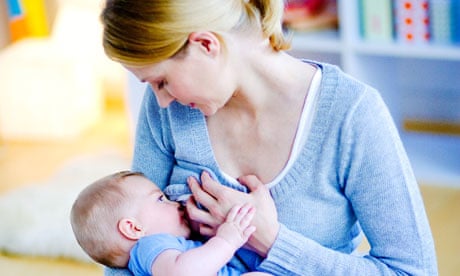An article describing breastfeeding as "creepy", written by the deputy editor of a leading parenting magazine, has caused widespread outrage on the internet and prompted protests to the Press Complaints Commission.
Under the headline "I formula fed. So what?", Kathryn Blundell says in this month's Mother & Baby that she bottlefed her child from birth because "I wanted my body back. (And some wine)… I also wanted to give my boobs at least a chance to stay on my chest rather than dangling around my stomach."
She goes on to say: "They're part of my sexuality, too – not just breasts, but fun bags. And when you have that attitude (and I admit I made no attempt to change it), seeing your teeny, tiny, innocent baby latching on where only a lover has been before feels, well, a little creepy."
She concedes that "there are all the studies that show [breastfeeding] reduces the risk of breast cancer for you, and stomach upsets and allergies for your baby. But even the convenience and supposed health benefits of breast milk couldn't induce me to stick my nipple in a bawling baby's mouth."
She continues: "I don't think I'm the only one, either – only 52% of mums still breastfeed after six weeks. Ask most of the quitters why they stopped and you'll hear tales of agonising three-hour feeding sessions and – the drama! – bloody nipples. But I often wonder whether many of these women, like me, just couldn't be fagged or felt like getting tipsy once in a while."
The shockingly frank article has reignited the breast-versus-bottle debate. The Department of Health recommends that babies are fed only breast milk for the first six months of life – an aspiration achieved by only one in 100 UK mothers. Many women who are unable to breastfeed or who choose to use formula milk say they are made to feel guilty or inadequate by an increasingly vociferous pro-breastfeeding lobby.
Blundell's piece has electrified parenting websites and six people have complained to the PCC. Many are furious at the anti-breastfeeding message being sent out by a journalist in a senior position at a magazine read by new mothers. Others are more angry at the tone of the article and the reasons the author cites for not breastfeeding, rather than the fact that it is pro-bottle feeding.
A campaign group supported by nearly 500 people has been set up on the social networking site Facebook calling on Blundell to apologise. One member wrote: "As a formula-feeding mum who was unable to breastfeed, I am left wondering whether, thanks to this piece, people who see me giving my baby a bottle may assume that I am doing so because I could not be fagged to breastfeed/found the idea 'creepy'."
The article also attracted hundreds of comments on the Mumsnet website. One mother posted: "Even if it is intended to be tongue-in-cheek, you can imagine it having a bad effect on someone who's feeling vulnerable postnatally and struggling with breastfeeding."
On the pro-breastfeeding website Lactivist, one woman wrote: "This surely cannot be allowed, for a woman in her position to be so unapologetically negative regarding breastfeeding and generally spreading misinformation."
Another wrote on Clothnappytree.com: "While breastfeeding numbers are so low, a magazine targeting new mums should not be printing an article that is anti-breastfeeding. It is completely unsupportive."
Not all postings were unsympathetic to Blundell. One contributor to The Midwife Sanctuary, a website for midwives, wrote: "There are quite a few women that feel like this and are feeling alienated because of it. Not every mother has the urge to breastfeed and that doesn't make them less of a mother."
Mother & Baby has received scores of letters and emails in praise of the piece. Reader Emma Dwight emailed: "I love your article! Not only does it completely sum up the minds of us formula-feeding mothers, but does it with humour and respect for those breastfeeders too."
Miranda Levy, the magazine's editor, said: "Mother & Baby is a constant and vocal supporter of breastfeeding."
Of Blundell's article, she said: "This was her personal experience, and has a place in the debate. We have been inundated by emails applauding her 'refreshing' point of view: we have made readers feel 'normal' and less of a 'failure' for not managing to breastfeed – a situation which is incredibly common.
"The way you feed your baby is not a moral issue and at Mother & Baby we seek to support all new parents in what is a glorious, but often difficult and emotional, time."

Comments (…)
Sign in or create your Guardian account to join the discussion